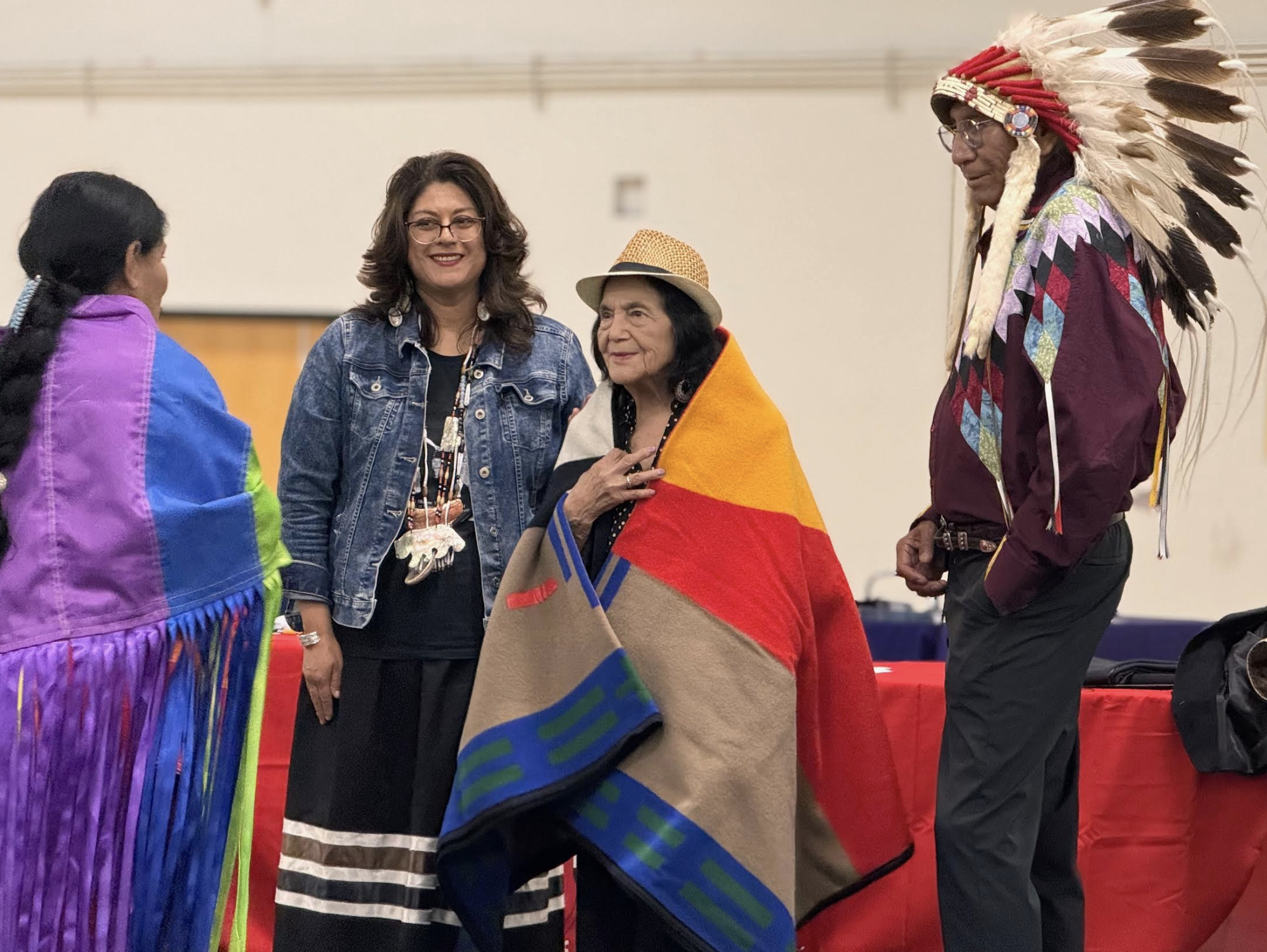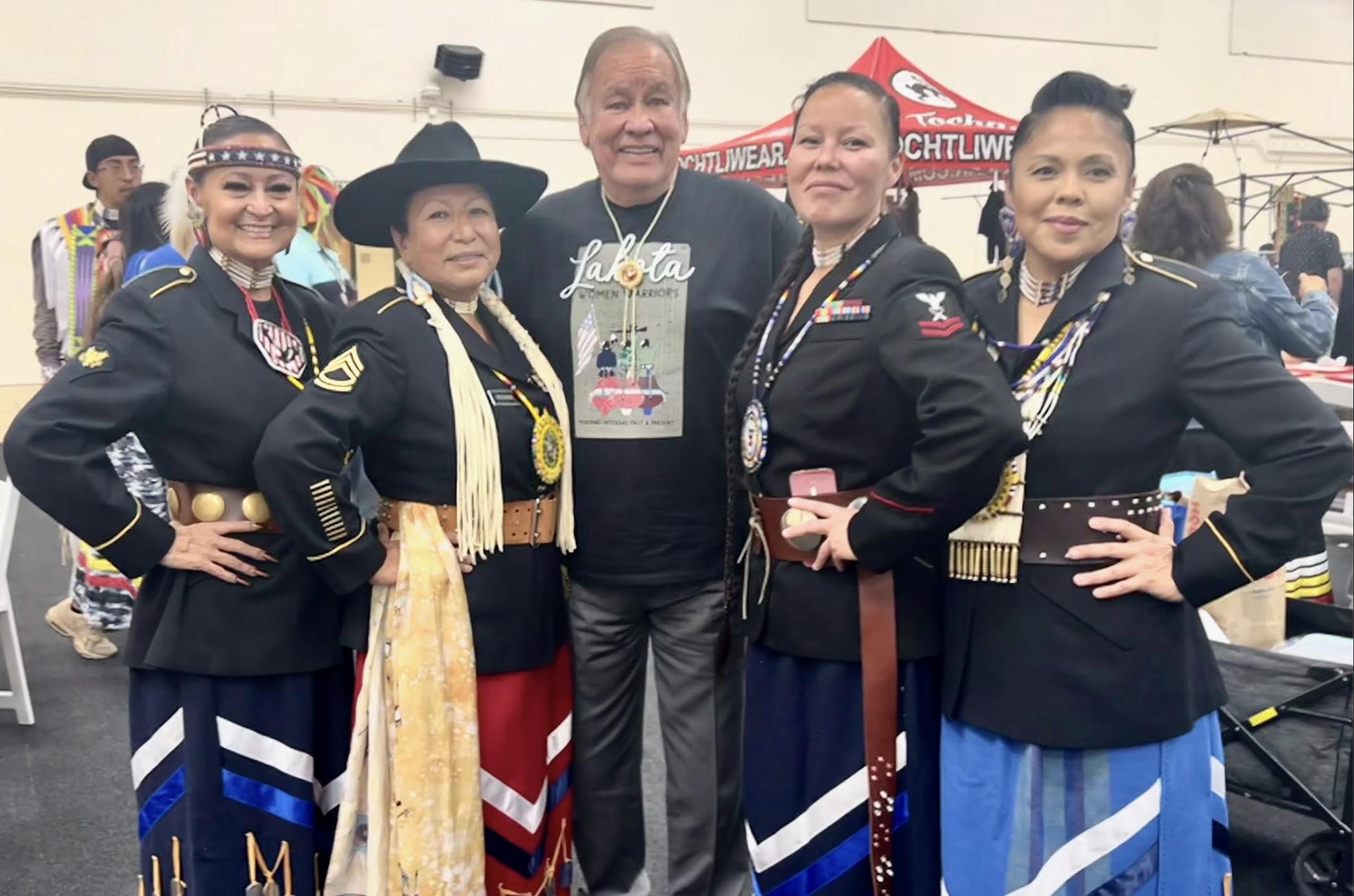
- Details
- By Arthur Jacobs
SAN JOSE, Calif. — On Saturday, November 9, the Indian Center of Santa Clara Valley honored Native American veterans at San Jose State University. Dr. Cynthia Teniente-Matson, president of the university, welcomed everyone warmly.
Chief Arvol Looking Horse, the spiritual leader of the Lakota, Dakota, and Nakota Oyate, also known as the Great Sioux Nation, was invited to preside over the honoring of two special guests: Dolores Huerta, co-founder of the United Farm Workers (UFW), and Olympic Gold Medalist Billy Mills (Oglala Sioux Tribe), a former Marine. In addition, ahead of Veterans Day, Chief Looking Horse honored veterans from various parts of Turtle Island.
Huerta, 94, was given three honors. Chief Looking Horse presented her with a wopila tanka (big thanks), one of the highest honors, for standing with the Great Sioux Nation at Standing Rock during the resistance to the Dakota Access Pipeline in 2016. The Dolores Huerta Foundation was also recognized for providing much-needed PPE during the COVID-19 pandemic, and Chief Looking Horse thanked her for helping to keep tribal members throughout Indian Country safe.
As a warrior for the people, Huerta was also honored by Native American warrior and U.S. Army veteran Sonia Tetnowski. Finally, Ohlone Tribal member Lucas Arellano honored Huerta as well. Michael Bellanger and Jake Miller blessed her with an honor song.
Ms. Huerta stated, “The honoring was one of the highlights of my life.”
Mills, who won the Olympic Gold Medal in the 10,000-meter event in Tokyo in 1964, was also honored. Mills spoke about his successful children’s book, Wings of an Eagle, which was published in July 2024. The book, co-authored with Donna Janell Bowman and illustrated by S.D. Nelson (a tribal citizen of the Standing Rock Sioux Tribe), tells an inspiring story for young readers.

Billy Mills with Native women warriors. (Photo/Arthur Jacobs)
Chief Looking Horse and the Bay Area community also honored Sonia Tetnowski, CEO of the Indian Health Center of Silicon Valley, for her unwavering dedication to the physical, cultural, and spiritual well-being of the Native community throughout the Bay Area. Her tireless efforts have had a profound impact on the community.
A wopila tanka (big thanks) was also presented to Dr. Cynthia Teniente-Matson, president of San Jose State University. The university recently opened the Native American, Indigenous Student Success Center, which greatly contributes to the revitalization of Native American culture, ceremony, and spirituality.
“It is time for us to return to the sacred. To return to prayer and our sacred sites, and stand united as one people, one faith, one prayer,” Chief Looking Horse said as he addressed the attendees.
More Stories Like This
Native News Weekly (August 25, 2024): D.C. BriefsUS Presidents in Their Own Words Concerning American Indians
Federal Judge Orders ICE to Halt Use of Pepper Spray, Arrests of Peaceful Protesters in Twin Cities
Tunica-Biloxi Cultural Leader John D. Barbry Walks On
Next on Native Bidaské: Federal ICE Activity in Minneapolis: Ruth Buffalo’s Perspective
Help us defend tribal sovereignty.
At Native News Online, our mission is rooted in telling the stories that strengthen sovereignty and uplift Indigenous voices — not just at year’s end, but every single day.
Because of your generosity last year, we were able to keep our reporters on the ground in tribal communities, at national gatherings and in the halls of Congress — covering the issues that matter most to Indian Country: sovereignty, culture, education, health and economic opportunity.
That support sustained us through a tough year in 2025. Now, as we look to the year ahead, we need your help right now to ensure warrior journalism remains strong — reporting that defends tribal sovereignty, amplifies Native truth, and holds power accountable.
 The stakes couldn't be higher. Your support keeps Native voices heard, Native stories told and Native sovereignty defended.
The stakes couldn't be higher. Your support keeps Native voices heard, Native stories told and Native sovereignty defended.
Stand with Warrior Journalism today.
Levi Rickert (Potawatomi), Editor & Publisher

